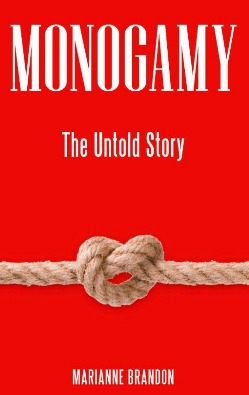by Anna
This past Sunday’s Coffee Talk on monogamy was exciting for me not only because it was the first one that I have been able to attend, but also because it covered a topic that has been on my mind for the past couple of years. Most of my romantic relationships could be described as polyamorous or non-monogamous, but the last serious relationship that I was in was monogamous for most of its duration. That experience challenged me with the paradox that I’m highly skeptical of monogamy in theory, but it worked surprisingly well for me in practice. As someone who has identified as non-monogamous for most of her adult life and dismissed monogamy as unrealistic, often indicative of an underlying and unhealthy need for control, and even unethical, this shook me up a bit and made me rethink some of my rather rigid assumptions about the nature of relationships, commitment and, yes monogamy.
because it was the first one that I have been able to attend, but also because it covered a topic that has been on my mind for the past couple of years. Most of my romantic relationships could be described as polyamorous or non-monogamous, but the last serious relationship that I was in was monogamous for most of its duration. That experience challenged me with the paradox that I’m highly skeptical of monogamy in theory, but it worked surprisingly well for me in practice. As someone who has identified as non-monogamous for most of her adult life and dismissed monogamy as unrealistic, often indicative of an underlying and unhealthy need for control, and even unethical, this shook me up a bit and made me rethink some of my rather rigid assumptions about the nature of relationships, commitment and, yes monogamy.
Perplexed in the face of my own personal shift, I searched for resources on monogamy – what it was and how to practice it. There are lots of books telling you about polyamory, swinging, open relationships and other forms of ethical non-monogamy – shouldn’t there be even more about the most common form of romantic relationship in our society? Well, I soon realized that ‘marriage’ is code for ‘monogamy.’ That’s the weird thing about it – if you want to find printed insight on monogamy, you find yourself turning to books on marriage. But because these resources assume monogamy, they reflect on the nature and practice of monogamy only incidentally. When I got the memo that Johnny Murdoc was going to take the ‘monogamous’ bull by the horns, I was happy to have the chance to hear some of his perspectives and to have some of the assumptions that I have made about monogamy broken down even further.
It seemed to me that Johnny was suggesting a kind of monogamy that’s conscious and that actively works at staying conscious. This monogamy requires the same amount of negotiation, and open communication that polyamory does. It’s a bit of a monogamy-strawman floating around non-monogamous communities that half-deceptions and rigid roles under-gird monogamous relationships. At the same time, a few minutes looking at the comments and some posts on even quality marriage blogs like Engaged Marriage, marriedmansexlife and the forum Talk about Marriage show that there is more than a kernel of truth to this in many cases. A polyamorous friend of mine talked to me once about his last monogamous relationship in which he just expressed an interest in opening things up, while his girlfriend’s work schedule made it difficult for them to spend much time together. That was the death knell of the relationship. For many monogamous people, even an interest in sex with other people constitutes a vital threat to the relationship, thus making concealment of desires necessary. But isn’t this also often the case in non-monogamous relationships? What happens when people who have been poly for years and have developed their relationship on that foundation suddenly find out that one person in a dyad wants monogamy? Concealment and squelching of desires in order to maintain roles can happen in non-monogamous relationships just as easily.
Johnny started the discussion by humbly eschewing ‘expert status’ and emphasizing that he knows how to be monogamous with Evan, his partner, for 9 years and that he would share what has worked in their partnership so far. One exchange that he mentioned that really resonated with me had to do with articulating a monogamous agreement and what counts as cheating. The example that Johnny used had to do with porn and masturbation. Lots of couples feel that porn use and (less commonly) masturbation constitute infidelity – that sexuality should be expressed exclusively in the context of the relationship. Johnny and Evan went through a period in which they had to work out where their common boundaries were on these issues. Interestingly enough, the boundaries that they made for themselves consciously and together were more liberal than the ones that they had previously assumed that they had without talking about it.
A similar thing happened to me a few months after my former boyfriend and I committed to being monogamous. Neither one of us bothered to talk about what monogamy meant for us, we both assumed that we knew what it meant. One night, I was at a party without him and wound up sitting on someone’s lap, flirting and getting tickly back rubs, not really thinking about it. As I walked home to my boyfriend’s place, I realized that sitting on a girl’s lap in a flirty way isn’t a very monogamous thing to do, and that I better tell my partner about it. I was terrified: would that be the end of our relationship? I wasn’t sure whether what I did was cheating, but hiding it from him would have definitely felt like cheating. So I told him. He was kind of disturbed by the whole thing, but we decided that that sort of thing was fine for us, as long as we reported ‘grey-area’ moments to each other as soon as possible. Now I know that for many monogamous couples, this sort of behavior is nowhere near a ‘grey-area’, but for our relationship it was fine. Everyone has to work that out for themselves.

Another thread of the discussion that really stood out to me had to do with ‘being monogamous’ versus ‘practicing monogamy’ and the success or failure of a relationship structure having to do with the relationship dynamics involved. Polyamory for me has been successful with some people, and less successful with others. Johnny Murdoc can attest to successful monogamy with Evan. Kendra found that monogamy may be possible for her in some relationships, for example with her current partner (even though they are not monogamous), but not in others.
It amused me that the issues at stake here resembled those that come up at the polyamory discussion group that I go to. While there are important differences between monogamous and polyamorous relationships, healthy relationships seem to share many characteristics with other healthy relationships, regardless of structure.
Johnny mentioned the human need for novelty and security and how these needs are often at odds with one another. He suggested that people who feel a stronger need for security tend to be attracted to monogamy. This makes sense, but I wonder if our thinking of monogamy and non-monogamy as oppositions is skewing our thinking in this area. Polyamorous and other non-monogamous communities developed in response to a culture that privileges monogamy. So we tend to think of polyamory vs. monogamy, and that obscures the functional similarities between monogamy and some kinds of non-monogamy. For example, many of the securities that you would logically look to a monogamous relationship for, could also be found in a closed triad or quad. One attendee at the coffee talk suggested that non-monogamy has its own sets of securities. She mentioned the advantage of financial security, but did not elaborate. Her remark reflects my experience, even outside of closed relationships. When you have multiple partners and you break up, even if you break up with your primary partner, you don’t go from having all of the romantic and sexual attentions of one person to having none at all. It’s been my experience that in those cases, relationships shift a bit, and growing connections with remaining partners can be healing and supportive of an amicable and friendly break-up, thus creating a lot of emotional security within the community.
The amount of ‘givens’ that monogamy afforded me were really productive for me – it gave me structure in which to deepen my relationship and also deepen other parts of my life. I experienced that ‘freedom paradox’ in which voluntarily giving up freedom brought me more happiness and focus. In some ways that has to do with security, but I think that for me it’s also about autonomy. I like to organize my time in reference to what I want to do. Considering one person, who also has their own plans and interests is feasible for me, but thinking about a primary partner and their secondaries along with any secondaries I may have has been frustrating for me in the past. Since having a primary relationship has become important to me over the last few years, during my ‘year of monogamy,’ I experienced relief from a lot of the scheduling pressures I had experienced before – I could pursue work, hobbies, projects and friends full-throttle and still have time for a partner and myself. That wasn’t impossible, but it was much harder when I was poly, and often it was time for myself that fell through the cracks – which contributed to me being less effective in my relationships. But a casual listen to PolyamoryWeekly will let you know that time management is a big part of being sucessful at polyamory.
To sum up, Johnny Murdoc shared a model of monogamy that addresses my concerns about it more than other people who talk about monogamy. I’ve often worried that as time wears on, I’d have to choose between being a sexual person and being with my long-term partner and that a monogamous relationship isn’t as well-equipped for dealing with changes in desire as polyamorous relationships. The kind of monogamy that Johnny Murdoc talks about seems to hold space for negotiating ways for dealing with interests that go outside of the relationship. I find it fascinating that what this kind of monogamy (I’ll go ahead and call it ‘ethical monogamy’) and ethical non-monogamy have in common is an absolute intolerance for cheating. While cheating is redefined as ‘breaking important agreements,’ because there is so much space for getting needs met honestly, there’s no excuse for cheating. In the anthology The Bitch in the House, Hannah Pine talks about the development of her non-monogamous relationship after an incident of adultery; she writes: ”I think, quite simply, we made a decision, just as you have made yours, whatever it may be. For myself, I refuse to pathologize adult, consensual sex, especially when I’m not involved.” I read this years ago, and this declaration served as a foundational statement for my own sex positive non-monogamy. After this weekend’s coffee talk, I see that it can serve equally well as the foundation for a sex positive monogamy as well.
monogamy (I’ll go ahead and call it ‘ethical monogamy’) and ethical non-monogamy have in common is an absolute intolerance for cheating. While cheating is redefined as ‘breaking important agreements,’ because there is so much space for getting needs met honestly, there’s no excuse for cheating. In the anthology The Bitch in the House, Hannah Pine talks about the development of her non-monogamous relationship after an incident of adultery; she writes: ”I think, quite simply, we made a decision, just as you have made yours, whatever it may be. For myself, I refuse to pathologize adult, consensual sex, especially when I’m not involved.” I read this years ago, and this declaration served as a foundational statement for my own sex positive non-monogamy. After this weekend’s coffee talk, I see that it can serve equally well as the foundation for a sex positive monogamy as well.
Resources with interesting insights on monogamy:
Clarisse Thorn’s In Praise of Monogamy
Adam Philip’s On Monogamy
Johnny Murdoc’s interview ‘Negotiation and Agency, a conversation on successful relationships’
Esther Perel’s Mating in Captivity – a talk by Perel can be found here
‘Marriage without infidelities’ at the Good Men Project
This ‘Dear Sugar’ column is about infidelity, but it hints at the kind of monogamy that Johnny Murdoc talks about.
Anna, that was a perfect summary of what monogamy can be to sex-positive people. I still consider myself polyamorous, but I shy away from declaring anything for certain. I think monogamy is an under-estimated term that implies total intolerance and inflexibility. That’s obviously not always the case. The same ideals that embody polyamory can sometimes be adapted to monogamy, or some form thereof. I just don’t think we’re monolithic. I think everyone reading this blog agrees.